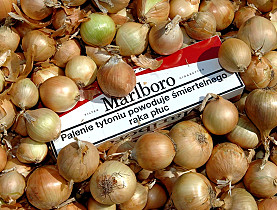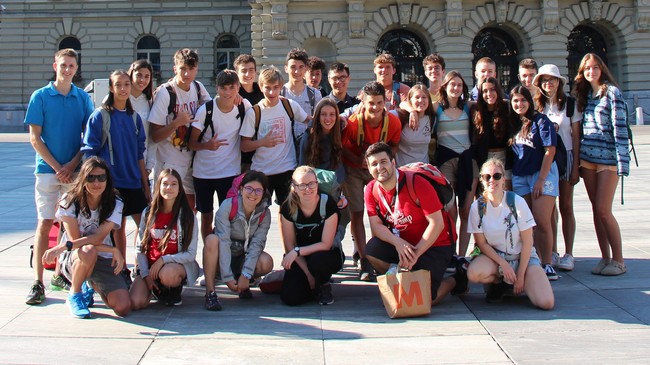
WHO takes aim at tobacco smuggling

First steps have been taken in Geneva towards a new treaty to combat tobacco smuggling, blamed for higher consumption and billions in lost tax revenues each year.
Officials from 130 countries and several international agencies were speaking after the first negotiations under the World Health Organization (WHO). They called for the pact to be ready for adoption by 2010, but added political will was needed.
They discussed a protocol to the WHO international treaty on tobacco control, which already bans sales to minors and tobacco advertising and sponsorship.
The United Nations agency estimates five million people die each year of tobacco-related diseases. Up to $50 billion (SFr55 billion) is also believed to be lost annually in tax revenues.
Many countries said the new pact should include a licensing system for suppliers and distributors, a “tracking and tracing regime” to monitor cigarettes through the supply chain and stronger law enforcement with stiff penalties, officials said.
“We need a protocol that is practical, effective and strong,” said Ian Walton-Georges, who chaired the weeklong talks. “A start has been made and we will ensure momentum will be continued.”
Further negotiations are expected in October and in 2009 before a draft text is presented in 2010 to the 152 countries which have ratified the Framework Convention on Tobacco Control.
Switzerland has signed the convention but not yet ratified it.
Money laundering
Tobacco smugglers divert legally traded cigarettes to black markets in all countries, especially rich ones, according to Walton-Georges, who works at the European Anti-Fraud Office.
“These are organised criminal gangs whose profits from illicit trade are ploughed into money laundering, VAT fraud and other criminal activities,” he said.
“Countries of Europe are particularly targeted because so much money can be made there. Last year in the European Union, we probably lost €6 billion (SFr9.6 billion) – and that is what we know about,” he added.
Illicit trade in tobacco products significantly contributes to death and disease caused by tobacco consumption and to the rise in tobacco consumption by making cigarettes “cheaper, more accessible and more difficult to regulate”, according to the WHO.
Activists welcomed the progress, but insisted industry must be kept from influencing the negotiations and public health policy.
Philip Morris/Altria and Japan Tobacco – both of which are based in Switzerland – were among manufacturers closely following the talks, they said.
“Smugglers are now on notice that their days of making vast profits with little chance of being caught – and if they are caught they are given negligible penalties – are coming to an end,” said Deborah Arnott from the Framework Convention Alliance, which links 300 non-governmental organisations in 100 countries.
Swiss could do better
It was revealed earlier this month that cigarette sales in Switzerland in 2007 had plunged to their lowest level in 40 years, with smokers purchasing 625 million packets, a drop of almost five per cent over 12 months.
While specialists says that the decrease is probably due to price increases, bans on smoking in public places and prevention campaigns, the WHO says the Swiss do little to apply its recommendations.
There is no national legislation banning smoking from public places, and advertising is only banned on radio and television. But the WHO reckons it is on the tax front that the Swiss have to act.
In Switzerland, taxes represent 55 per cent of the price of a packet, whereas the WHO believes that this figure should be around 75 per cent to have a dissuasive effect on consumers.
swissinfo with agencies
Smoking bans are slowly become a fact of life in Switzerland.
After cantons Ticino and Solothurn, Graubünden and Appenzell Outer Rhodes accepted in November to ban smoking from public places. Restaurant and café owners will be able though to set aside closed smoking areas.
Ticino outlawed tobacco use last April. solothurn will follow suit next year.
Geneva will vote on the issue this year, while projects are being drawn up in other cantons (Aargau, Bern, St Gallen, Valais, Zug)
Federal anti-tobacco legislation is currently being discussed in parliament.
The Swiss border guards are the armed service of the federal customs administration, a department of the finance ministry.
There are approximately 2,000 border guards, including 100 women. They work at 91 fixed locations and in 35 mobile units along Switzerland’s 1,881 kilometres of borders.
Their main tasks are fighting illegal immigration, cross-border crime and contraband, but they also deal with counterfeiting and the smuggling of weapons, plants and animals.
8,300 people die of tobacco-related illnesses a year in Switzerland.
16,000 people are diagnosed with tobacco-related illnesses.
Smoking costs Swiss society SFr10 billion.
Four million work days are lost because of tobacco-related illnesses.

In compliance with the JTI standards
More: SWI swissinfo.ch certified by the Journalism Trust Initiative
















![The four-metre-long painting "Sonntag der Bergbauern" [Sunday of the Mountain Farmers, 1923-24/26] had to be removed by a crane from the German Chancellery in Berlin for the exhibition in Bern.](https://www.swissinfo.ch/content/wp-content/uploads/sites/13/2025/12/01_Pressebild_KirchnerxKirchner.jpg?ver=cb688ed5)














You can find an overview of ongoing debates with our journalists here . Please join us!
If you want to start a conversation about a topic raised in this article or want to report factual errors, email us at english@swissinfo.ch.